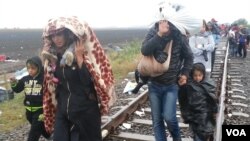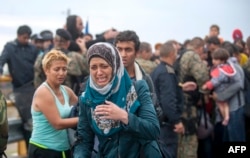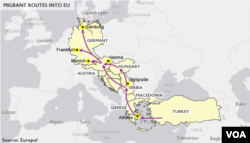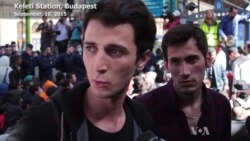Many of the thousands of refugees who continued to stream through Europe on Thursday in their effort to escape violence in the Middle East and North Africa weren't certain of their ultimate destinations, but a lot of those crossing from Serbia into Hungary through a gap in a newly erected border fence were sure of one thing: They did not want to register in Hungary.
While none wanted to speak on the record or have their faces shown on camera, they told VOA that they wanted to go to countries other than Hungary or Austria.
Some wanted to ultimately go to Germany and were scared they would be stuck in Hungary or Austria if they registered. Others said they wanted to go to Sweden or other countries in Western Europe.
"I'm a travel agent. I know there's nothing to do in Hungary," a man who did not want to reveal his identity said. He asked whether there was a way to cross the border without getting registered.
"No fingerprints," several others said, as they stuck their thumbs out to make thumb impressions in the air.
Camping in cornfields
Some could be seen leaving the usual track and going into surrounding cornfields to avoid authorities and the buses that were waiting to take them to registration camps.
Several large groups had lit fires close to the border to help fight the cold in the wet, drizzly weather. They were cooking and eating corn freshly picked from the fields around them.
When asked why they had stopped just minutes from where buses and volunteers with aid were waiting, they initially gave excuses but later admitted that they were looking for ways to cross without registering.
Confusion seemed to surround the situation. Many migrants were not exactly sure why they were avoiding registration. They were following the advice of friends or fellow travelers.
Others were not sure which country they should go to in Europe. They had been on the road for a month or longer. With cellphones long dead, their only sources of information were fellow travelers or people they met on the way.
Most seemed weary of media attention and hid their faces as journalists scrambled to take their pictures. Very few spoke English.
Both Austria and Hungary said record numbers of migrants had crossed their respective borders overnight into Thursday. Budapest said more than 3,000 people had crossed into Hungary from Serbia, while Austria said a similar number had entered its territory from Hungary. Austria’s national train operator suspended train service from Hungary for fears of overcrowding.
Hungary recently passed a law to criminalize unauthorized border crossing. The law is supposed to take effect September 15, and anyone violating it risks jail time. The Hungarian military has started exercises to help the police at the border.
At least one military convoy with supplies was seen on the main highway from the capital, Budapest, to the Serbian border on Thursday.
U.S. response
The United States said Thursday that it would accept at least 10,000 Syrian refugees in the coming year and increase its humanitarian assistance for those fleeing the violence in Syria.
White House spokesman Josh Earnest said President Barack Obama had directed officials to make preparations to let the refugees enter the country, starting next month.
Earnest said the new effort reflected a "significant scaling up." The U.S. accepts 70,000 refugees annually from around the world.
He said background checks on the new arrivals would be "robust" to ensure U.S. national security was not endangered. U.S. intelligence chief James Clapper said this week that he feared that Islamic State insurgents might infiltrate the refugees escaping conflict in the Mideast as they headed to other countries.
Contradictions in Europe
Europe's chaotic response to the continent's biggest migrant crisis since World War II was on display with contradictory messages.
The European Parliament, in a nonbinding vote, overwhelmingly supported the call by European Commission chief Jean-Claude Juncker for country-by-country mandatory quotas to accept 160,000 refugees, mostly from Syria, over the next two years.
But Romania became the latest Central European country to reject the quota plan, saying there was "no way" it would agree to take in as many asylum-seekers as Juncker wanted. Slovakia also opposed the plan.
Germany
German Vice Chancellor Sigmar Gabriel told parliament that about 450,000 refugees have already have arrived in Germany this year, with 37,000 of them just in the first eight days of September.
"Honestly speaking, this shows that the distribution of 160,000 refugees across Europe is a first step, if one wants to be polite," Gabriel said of the quota plan. "Or you could call it a drop in the ocean."
Chancellor Angela Merkel was cheered as she visited a Berlin refugee center, posing for selfie photos with new arrivals. They called her "Mama Merkel."
Laith Majid, an Iraqi refugee who reached Berlin with his wife and four children, said, "People know the meaning of love. We came out from death and I thank Allah for the life we are in now."
WATCH: Volunteers help migrants at Keleti station in Budapest, Hungary
BROWSE: Europe Migirant Crisis photo blog









